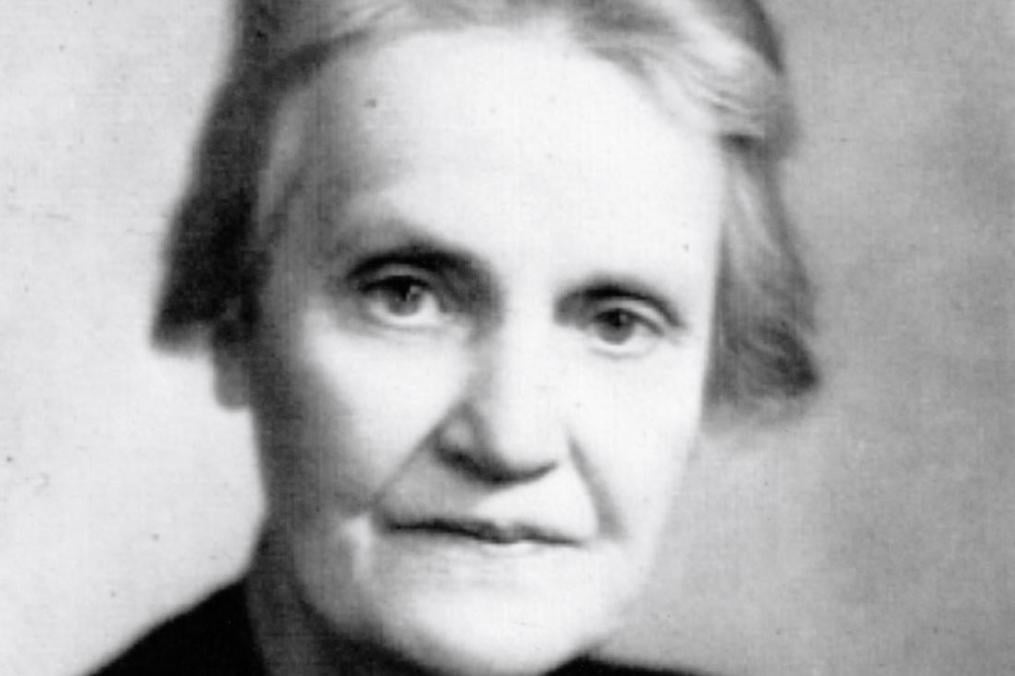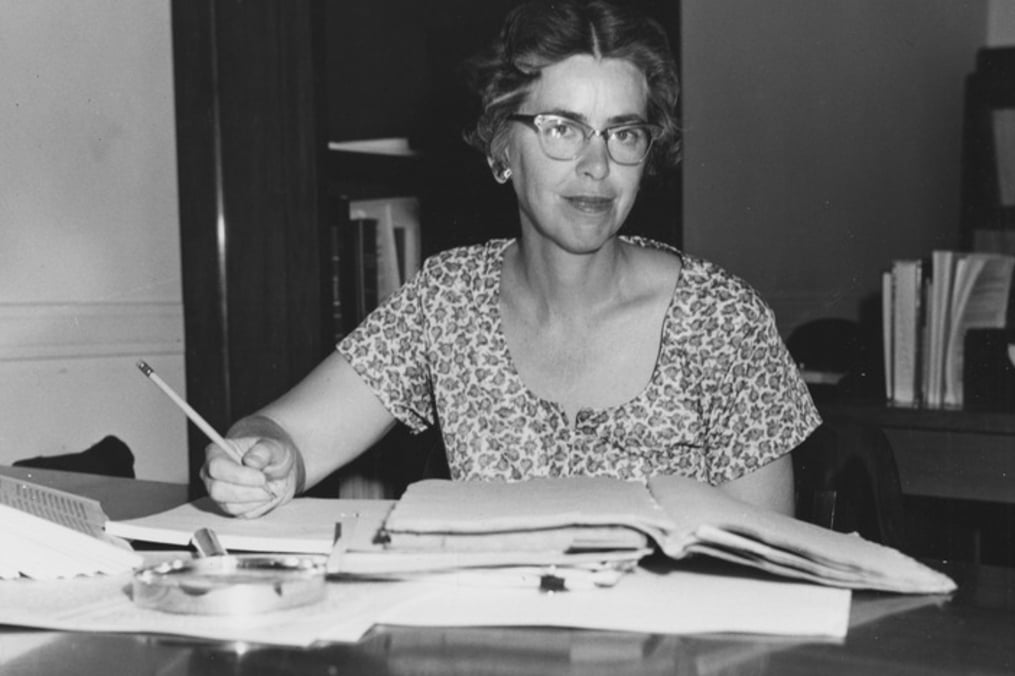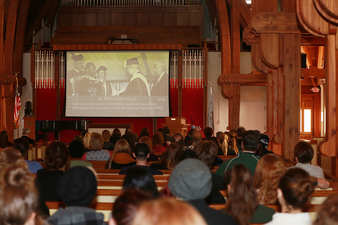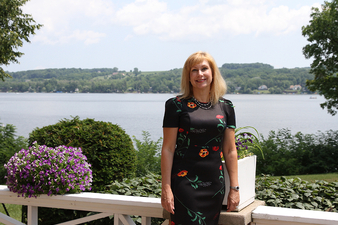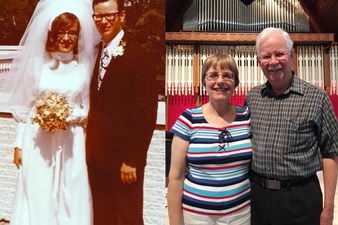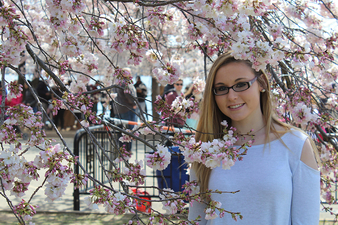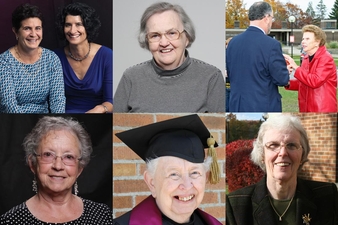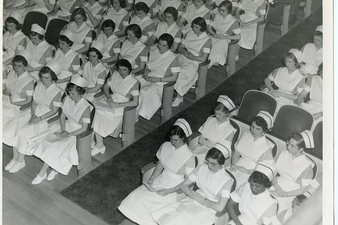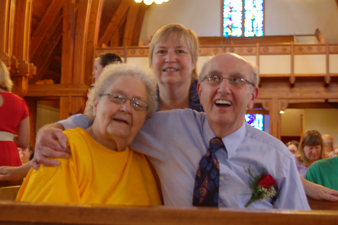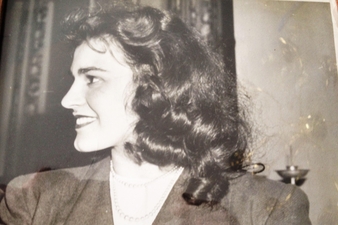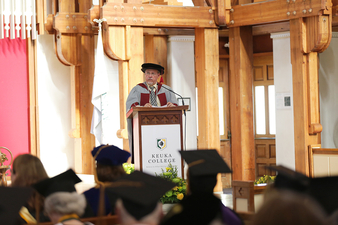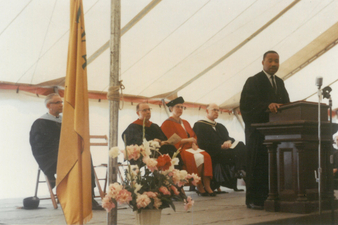Frankie Lawrence Griffin Merson was a woman ahead of her time.
Social reformer. Suffragette. Innovative educator. Advocate for justice. Frankie Merson filled all of these roles and many others throughout the first half of the twentieth century. And she did so from the campus of Keuka College.
In fact, she personified the College’s original mission as set forth by founder George Harvey Ball: educating young students and adult learners “to bring strength to our nation and to help humanity.”
She brought students into the field for experiential learning before the College’s much-lauded Field Period® program existed. She created classes that were not only unprecedented but were the envy of universities like Yale. She helped win women in New York the vote years before the 19th amendment granted that franchise nationally. And she used the College as the foundation – spiritually, academically and physically – for a lifetime of advocacy for social reform.
Through her speeches, lectures, letters, and travels, Frankie expanded the role of women in public life, advanced education in the field of sociology, and was a consistent voice for equal rights and social progress.
She was “always interested in the progress of women,” the Rochester Times-Union noted in a 1949 story upon her retirement.
And she was exactly the type of person Women's History Month, which is being commemorated this month, was intended to celebrate: Women who had a hand in shaping history – and, more importantly, their future.
The March for Suffrage
As New Yorkers prepared to go to the polls in November 1915 to decide whether to give women the right to vote, young Frankie Merson had already experienced considerable travels and travails.
Having spent the first 10 years of her life in India with her missionary parents, she returned to the states with her family, collected bachelor’s degrees from both Keuka College (1904) and Bates College in Maine (1907), and served as an editorial assistant with the American Baptist Foreign Missions Society in Boston.
Not yet 35, she had been widowed when her husband, William Hently Merson, died in 1912 at their farm in Huntingdon, Quebec, leaving Frankie with an infant daughter, Ellen Elizabeth.
She returned to Keuka Park, supporting herself and her young daughter by teaching English, Greek, and Latin at “Old” Keuka College, until it closed in September 1915 amid financial difficulties. Two months later, New York’s voters turned thumbs down on women’s suffrage.
If Frankie was disappointed in the outcome, there is no record of it. What there is a record of is her response.
Combining her talents for advocacy and education – and no small amount of the missionary zeal that was surely in the genes of a child of Baptist preachers – Frankie made a mission of securing women the vote.
She was an organizer, demonstration leader, and much sought-after speaker for the state Women’s Suffrage Party and, from 1915-17, stumped tirelessly for the cause, organizing and speaking at gatherings throughout Yates County and beyond.
Augmenting those efforts, she was a familiar presence in the letters section of western New York newspapers.
“Ninety-five percent of the voters of Yates County will believe in women suffrage before the war is over. We only ask you to think ahead now, before November 6th,” she urged readers of the Yates Chronicle in the fall of 1917. “Time, effort, prayers have gone into this campaign. There are scores of women in Yates County who have given all their leisure for patriotic and suffrage work.”
Along with her still-active, and activist, parents – future Keuka College trustee and treasurer Zebina Flavius (Z.F.) Griffin and Elizabeth (Libbie) Cilley Griffin – Frankie not only rallied supporters but canvassed Yates County to help collect roughly 3,100 signatures on pro-suffrage petitions. Mounted on placards, these petitions were paraded through the streets of Manhattan just weeks before the 1917 vote.
On Nov. 6, 1917, by a margin of some 100,000 votes, women won the right to vote in New York.
The victory did not come easily, as Frankie hinted in a letter written more than 30 years later: “When I was a woman suffrage organizer, I not only got names (thrown at me) but was stoned here in Yates County – once, and not very hard!”
The victory of Frankie Merson – and suffragettes like her – ultimately benefited women not just in New York but throughout the nation. As the first state east of the Mississippi to grant women the vote, New York is credited by many historians with adding momentum to the national suffragist movement, which would result in the 19th amendment providing women the vote nationally in 1920.
Educational Advances
With the vote secured, Frankie stayed active with the suffrage movement in its new incarnation as the New York State League of Women Voters.
A lifelong member of the Women’s Christian Temperance Union, she was a frequent lecturer from 1918-1920 for the Anti-Saloon League.
It was also in 1920 that she completed her thesis, “Recent Tendencies in the Labor Movement in England and America,” and earned her master’s degree in political science from Columbia University.
The progressive streak she demonstrated as a suffragette remained in evidence as she then taught history, government, and sociology for two years at Storer College, a historically black college in Harpers Ferry, West Virginia, before returning to Keuka College in 1924.
Three years later, she became head of the College’s Department of Political Science and Sociology, a position she held for 20 years. At the end of that tenure, the Rochester Times-Union would report, “(s)he was instrumental in developing the department of sociology to one of the outstanding departments of the college with a widespread reputation for excellence.”
Always an innovator, Frankie escorted her students to real-world settings even before the College’s much-heralded Field Period® program was launched in the 1940s. And she created new and transformative ways of teaching the then-still evolving field of sociology.
“She introduced and developed a number of new courses in the department, and Prof. Ernest R. Groves, North Carolina educator, stated that he considered the marriage and family life course offered at Keuka one of the earliest ever offered at a college or university,” wrote the Geneva Daily Times in a May 19, 1949, story announcing Frankie’s retirement. “The course in theories and social reconstruction at Keuka also was offered ten years before students of Yale petitioned that that university offer such a course.”
Frankie was a proponent of experiential learning before that label existed. An undated newspaper story recounts her taking five College sociology students (Shirley Brown, Ruth Logan, Adele Rosenberg, Wilma Sculley, and Dorothy Somers) to Syracuse to attend the Institute of International Relations, sponsored by the American Friends Service Committee.
“Among the subjects discussed were the need for racial equality and the importance of trade unions in the postwar world,” the story noted.
On another occasion, Frankie gathered 30 students from the Social Work, Government, and Social Science Methods classes for a field trip to the Yates County Home, Esperanza, for a tour of the facilities.
But then, Frankie was a veteran of what can only be described as the ultimate in experiential learning. For the better part of a year from 1926 to 1927, she taught in what was described as a Floating University, which combined study aboard a ship with a trip around the world.
Always a Voice
Frankie stepped down as department chair in 1947, then taught part-time in the – new – Sociology Department until her retirement in June 1949.
During her tenure, the student body grew from fewer than 100 to 455.
She remained, through these years and after, a voice for justice and social change. One representative example: An October 1948 letter outlining her support for Progressive Party candidate Henry A. Wallace for president, in which she decried what she called “the militarization of the U.S.”
“Shall civilian status (i.e., the non-military) be a second-class citizenship and civil rights be suppressed ‘for security reasons?’” she wrote. “When I say the militarization of the U.S. is the issue I mean the terrific monopoly, the high cost of living, the loss of civil rights, including academic, scientific and labor rights, negro segregation even, are inextricably tied in with our militarization.”
And, as always, Frankie was never afraid to challenge authority. When she read of efforts to pass a constitutional amendment to limit the power of Congress to tax incomes more than 25 percent, she wrote the New York Times – seeking not only the facts but an explanation of why the story had not been more widely reported.
She got a reply.
The girl who grew up in India, the young woman who moved with her husband to Canada, the professional who spent three years in Boston, Frankie remained rooted, in retirement, along the shores of Keuka Lake, which, in a 1965 letter to the Penn Yan Chronicle-Express, she described as “the safest, the most inviolate, the most desirable and most beautiful spot on this globe,” before adding – you can almost see her wink – “at least to our way of thinking.”
Frankie stayed engaged in the issues of the day and the life of Keuka College until her death on Dec. 1, 1973. She is buried, with her parents and daughter, in Keuka Park Cemetery, just miles from the campus she called home for most of her formative years and much of her professional life
CAREER/PERSONAL HIGHLIGHTS
Jan. 7, 1882: Frankie Lawrence Griffin is born in Gilbert Mills (Oswego County) to Zebina Flavius (Z.F.) Griffin (1844-1938), future Keuka College trustee and treasurer, and fellow Baptist missionary Elizabeth (Libbie) Cilley Griffin (1851-1927).
1883: The Griffins depart to India for missionary work with 18-month-old Frankie. She spends the next nine years there.
1893: The Griffins return from India and settle in Keuka Park.
1899: Frankie graduates from the Keuka College Institute, a preparatory school run in conjunction with the College.
1904: Frankie graduates cum laude with a bachelor of arts degree from Keuka College – a hard-earned diploma, she would reminisce in 1968: “B.A. meant Latin, Greek, French, German, and plenty of them, believe me!”
Circa 1905-08: Frankie serves for three years as an editorial assistant with the American Baptist Foreign Missions Society in Boston.
1907: She earns a bachelor of arts degree from Bates College of Lewiston, Maine.
Circa 1908: She marries farmer William Hently Merson of Huntingdon, Quebec, and moves to Canada.
1912: Merson dies in September (cause unknown), leaving Frankie to raise daughter Emma Elizabeth Merson, who was born earlier in the year.
1913: Frankie returns with Elizabeth, as she is known, to Keuka Park, where she teaches English, Greek, and Latin at “Old” Keuka College until it closes in 1915.
1913: Frankie helps form the Keuka College Women’s Club, which sought to raise funds for the College’s endowment.
1915: Frankie becomes an organizer, demonstration leader, and much sought-after speaker for the state Women’s Suffrage Party.
1915-17: Frankie stumps tirelessly to win women the vote in New York, organizing and speaking at gatherings throughout Yates County and beyond. She helps collect roughly 3,100 signatures on pro-suffrage petitions. Mounted on placards, these petitions were paraded through the streets of Manhattan just weeks before the 1917 vote.
Nov. 6, 1917: By a margin of some 100,000 votes, women win the right to vote in New York.
1918-20: Frankie, a lifelong member of the Women’s Christian Temperance Union, is a frequent lecturer for the Anti-Saloon League.
1920: Frankie earns her master’s degree in political science from Columbia University, where she also studied Social Science.
Circa 1920-23: Frankie teaches history, government, and sociology for two years at Storer College, a historically black college in Harpers Ferry, West Virginia, that operated from 1865-1955.
1924: Frankie joins the faculty of Keuka College.
1926-27: Frankie teaches in a Floating University, which combined study aboard a ship with a trip around the world.
1927-47: She heads the College’s Department of Political Science and Sociology, establishing several groundbreaking sociology courses and regularly taking students off-campus for experiential learning opportunities.
1931: The 1931 Keuka College yearbook (which includes her signature) gives Frankie’s title as Professor (of) Social Science & Associate Professor of Christian Leadership.
September 1932: Frankie, who couldn’t vote until she was in her late 30s, receives a write-in vote as a delegate to the Republican state convention.
June 1949: Frankie retires from Keuka College.
1968: In hand-written recollections of Keuka College’s earliest days, Frankie lauds the evidently progressive-minded men of the College’s early co-ed days: “Let me pay tribute to the boys of Old Keuka. The girls never had the feeling of being tolerated or on the outside. Not only were poor boys as good as prosperous boys, but girls were as good as boys, a happy state of affairs for the girls, and if I am not mistaken, mighty wholesome for the boys also.”
Dec. 1, 1973: Frankie dies at age 91 in Soldiers and Sailors Memorial Hospital in Penn Yan.
Dec. 9, 1973: A memorial service is held for Frankie at the Keuka Park Community Center in Penn Yan.


